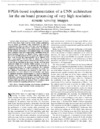Identificador persistente para citar o vincular este elemento:
https://accedacris.ulpgc.es/jspui/handle/10553/114632
| Título: | FPGA-based implementation of a CNN architecture for the on-board processing of very high resolution remote sensing images | Autores/as: | Neris Tomé, Romén Rodriguez Molina, Adrian Guerra, Raul Lopez, Sebastian Sarmiento, Roberto |
Clasificación UNESCO: | 220990 Tratamiento digital. Imágenes | Palabras clave: | Computer Architecture Convolutional Neural Networks Convolutional Neural Networks Deep Learning Earth, et al. |
Fecha de publicación: | 2022 | Proyectos: | Ministerio de Ciencia e Innovacin (Grant Number: PID2020-116417RB-C42) European Commission (Grant Number: 870485) |
Publicación seriada: | IEEE Journal of Selected Topics in Applied Earth Observations and Remote Sensing | Resumen: | Over the last years, Convolutional Neural Networks (CNNs) have been widely used in remote sensing applications, such as marine surveillance, traffic management or road networks detection. However, since CNNs have extremely high computation, bandwith and memory requirements, the hardware implementation of a CNN on space-grade devices like FPGAs for the on-board processing of the acquired images has brought many challenges. In fact, FPGAs show great advantages in terms of reconfigurability and performance-power ratio, whichmakes them a suitable election to deploy CNNs, although the computational capabilities of this type of hardware devices available on-board is limited, so implementations have to be carefully planned. In this paper, the authors present their work towards the implementation of an efficient CNN onto a spacegrade FPGA in order to achieve the on-board processing of very-high resolution remotely sensed images as soon as the data are provided by the sensor. All this work has been conducted within the EU-funded VIDEO project. As it will be presented in this paper, the work includes the introduction of a methodology based on the project constraints, the evaluation of different state-of-the-art CNN architectures by means of a new efficiency measurement also proposed in this work, the introduction of a new efficient CNN architecture, and finally, its optimized hardware implementation by means of high-level synthesis tools. | URI: | https://accedacris.ulpgc.es/handle/10553/114632 | ISSN: | 1939-1404 | DOI: | 10.1109/JSTARS.2022.3169330 | Fuente: | IEEE Journal of Selected Topics in Applied Earth Observations and Remote Sensing[ISSN 1939-1404], n. 15, p. 3740-3750 |
| Colección: | Artículos |
Citas SCOPUSTM
19
actualizado el 08-jun-2025
Citas de WEB OF SCIENCETM
Citations
18
actualizado el 08-feb-2026
Visitas
143
actualizado el 07-sep-2024
Descargas
314
actualizado el 07-sep-2024
Google ScholarTM
Verifica
Altmetric
Comparte
Exporta metadatos
Los elementos en ULPGC accedaCRIS están protegidos por derechos de autor con todos los derechos reservados, a menos que se indique lo contrario.
